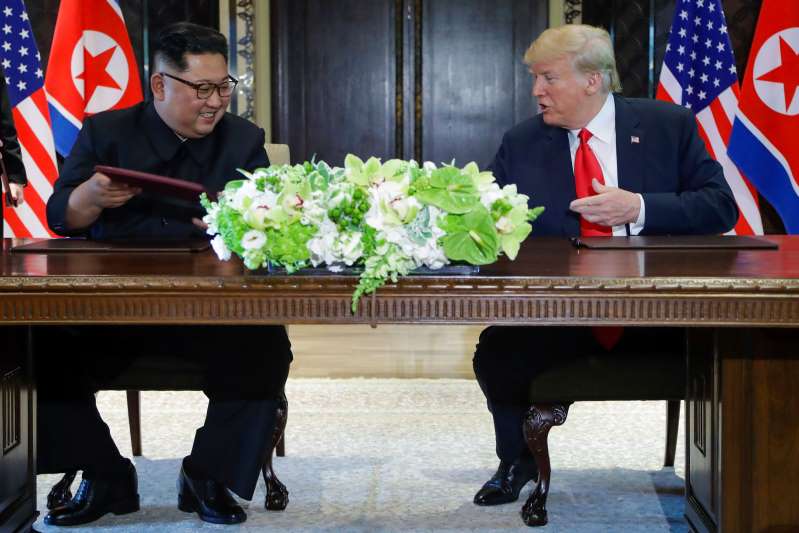By Simon Denyer, Washington Post–
On the second anniversary of President Trump’s summit with Kim Jong Un in Singapore, North Korea’s foreign minister said hope had given way to despair and relations between the two countries had descended into a “dark nightmare,” and vowed to bolster the country’s military might to counter U.S. threats.
Hope for improved relations had been high two years ago, Foreign Minister Ri Son Gwon said on Friday, but this has given way to “despair characterized by spiraling deterioration,” while “even a slim ray of optimism for peace and prosperity on the Korean peninsula has faded away into a dark nightmare.”
“The desire of the peoples of two countries to put a period to the world’s most antagonistic relations between the DPRK and the US and to open a new cooperative era of peace and prosperity runs deep as ever,” he said in a statement, referring to the Democratic People’s Republic of Korea, its official name.
“Yet the situation on the Korean peninsula is daily taking a turn for the worse.”
Ri said the North had completely shut down a nuclear test site, returned scores of remains of American service personnel and returned U.S. citizens held by North Korea, referring to them as “convicted felons,” presenting the steps as evidence of Kim’s “epoch-making resolve.”
The North, he said, had even suspended nuclear and intercontinental ballistic missile tests to build confidence with the United States, arguing that the Trump administration had often “expressed gratitude” for these steps.
But in return, he lamented, Washington had been “hell-bent” on exacerbating the situation, leaving North Korea “on the US list of targets for preemptive nuclear strike.”
The United States continued to fly nuclear strategic bombers into South Korean airspace, sail aircraft carrier strike groups in the surrounding seas and had introduced “cutting-edge” military hardware such as stealth fighters and drones into South Korea, turning the Korean Peninsula “into the world’s most dangerous hotspot haunted uninterruptedly by the ghost of nuclear war,” Ri said.
Washington, he said, had revealed its true intentions: regime change, along with “isolation and suffocation” of North Korea. Unless more than 70 years of hostility was fundamentally ended, the United States will remain a long-term threat, he added.
“The question is whether there will be a need to keep holding hands shaken in Singapore, as we see that there is nothing of factual improvement to be made in the DPRK-US relations simply by maintaining personal relations between our Supreme Leadership and the US President,” Ri said, arguing that Trump was using North Korea for his own domestic political gains.
“Never again will we provide the US chief executive with another package to be used for achievements without receiving any returns,” he said. “Nothing is more hypocritical than an empty promise.”
At a meeting of the country’s Central Military Commission last month, Kim “solemnly” pledged to bolster North Korea’s nuclear deterrent to cope with “unabated threats of nuclear war” issued by the United States, Ri noted.
Ri also complained that Secretary of State Mike Pompeo continuously made “nonsensical remarks that the denuclearization of the Korean peninsula” was still a U.S. goal.
North Korea maintains that it never agreed to unilaterally dismantle its nuclear weapons and that the United States also has an obligation to fundamentally reduce the military threat it poses to Pyongyang.
“The secure strategic goal of the DPRK is to build up more reliable force to cope with the long-term military threats from the US,” Ri said. “This is our reply message to the US on the occasion of second anniversary of June 12.”
Vipin Narang, an associate professor of political science at the Massachusetts Institute of Technology, said the North had commemorated the anniversary with some “metaphorical fireworks,” but said this final comment underlined how North Korea had continued to build up its military capabilities over the past two years.
“The reality is that the real danger — an expanded and improved missile and nuclear force — has progressed with little fanfare,” he tweeted.


Leave A Comment
You must be logged in to post a comment.